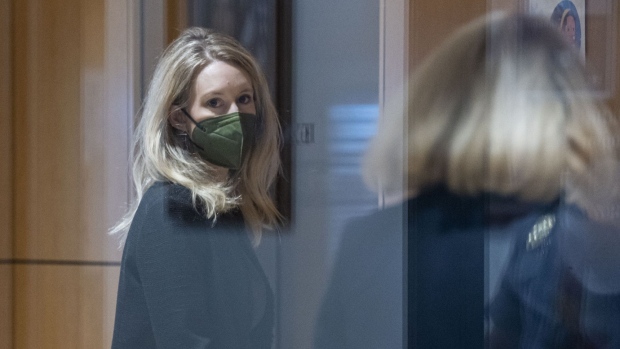Oct 14, 2021
Holmes hired dermatologist when going got rough
, Bloomberg News

When Theranos Inc. was under fire from health regulators, Elizabeth Holmes and her second-in-command hired a dermatologist to be the lab director at the blood-testing startup -- paying him handsomely to do little work, U.S. prosecutors say.
Sunil Dhawan, who’d been Theranos President Ramesh “Sunny” Balwani’s private doctor, testified Thursday at Holmes’s criminal fraud trial that he signed on as a full-time employee just one day ahead of a planned federal inspection of the lab in September 2015 and “assumed” that after the audit he was no longer an employee. Prior to that, all he’d done was visit the lab twice and sign paperwork, he said.
“I was in the room when the inspectors walked in,” he said. “I was introduced, and then after about an hour, I was asked to step out. I was not asked any questions.”
Following other former Theranos lab employees who testified for the government that the company was taking dangerous short-cuts, Dhawan was put on the stand to show that Holmes and Balwani weren’t serious about running a professional lab.
Holmes is charged with lying to patients and investors about the potential and accuracy of Theranos blood-testing machines and the financial well-being of the company that imploded spectacularly after it was once valued at US$9 billion. She has pleaded not guilty and faces as long as 20 years in prison if convicted. Balwani, who is Holmes’s former romantic partner, faces the same charges and is scheduled for a separate trial next year. He also pleaded not guilty.
Holmes’s lawyers argued before the trial that Dhawan had “unquestionable qualifications” to serve as lab director and that it would be “grossly unfair” for the government to portray him in front of jurors as unqualified.
The doctor arrived at Theranos at a difficult time. By late 2014, the startup’s blood-testing partnership with Walgreens drug stores was faltering and its lab had been cited for deficiencies by the California Department of Public Health. The lab’s previous director has testified he quit in disgust because Holmes and Balwani were trying to cover up the failures he’d flagged with the company’s technology and testing practices.
Dhawan conceded on the witness stand that all he knew about Theranos’s blood-testing technology was what he learned from doing Google searches and that the only experience he had with lab work involved biopsy specimens.
Dhawan was paid US$5,000-a-month for his role, initially as a consultant, the government said in a filing earlier this year. When asked by a prosecutor how many hours he worked in total for Theranos during the period from November 2014 to August 2015, he said, “No more than five or 10. It just wasn’t a lot.”
He couldn’t recall ever talking to a lab employee and he confirmed under questioning by Assistant U.S. Attorney Jeff Schenk that he’d never seen the machine that Theranos promised would revolutionize blood testing, the Edison.
Dhawan acknowledged that Theranos sent him hundreds of lab documents to sign, including memos that laid out procedures for conducting various blood tests and verification forms. He said he signed them all “whenever they were sent to me.”
Holmes’s lawyer made a point in his questioning of Dhawan to show that the dermatologist had reported to Balwani, not his client. Dhawan said his only contact with Holmes was to say “hello.” The cross-examination of Dhawan continues Friday.




